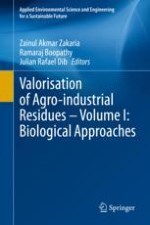2020 | OriginalPaper | Buchkapitel
4. Proteomics of Lignocellulosic Substrates Bioconversion in Anaerobic Digesters to Increase Carbon Recovery as Methane
verfasst von : Alicia Guadalupe Talavera-Caro, María Alejandra Sánchez-Muñoz, Inty Omar Hernández-De Lira, Lilia Ernestina Montañez-Hernández, Ayerim Yedid Hernández-Almanza, Jésus Antonio Morlett-Chávez, María de las Mercedes Esparza-Perusquia, Nagamani Balagurusamy
Erschienen in: Valorisation of Agro-industrial Residues – Volume I: Biological Approaches
Aktivieren Sie unsere intelligente Suche, um passende Fachinhalte oder Patente zu finden.
Wählen Sie Textabschnitte aus um mit Künstlicher Intelligenz passenden Patente zu finden. powered by
Markieren Sie Textabschnitte, um KI-gestützt weitere passende Inhalte zu finden. powered by
